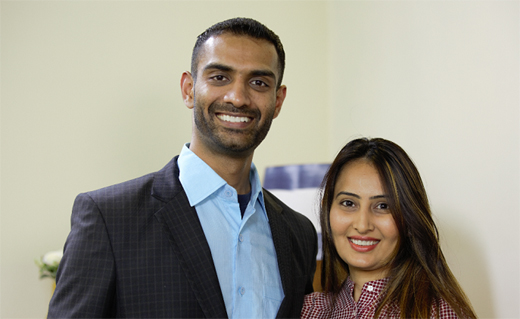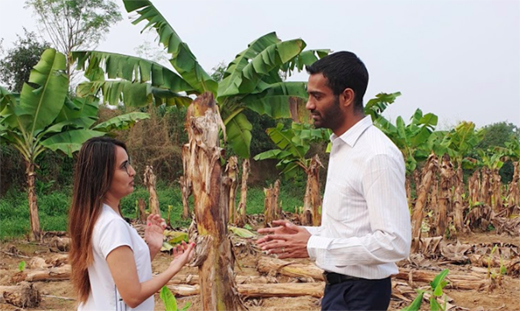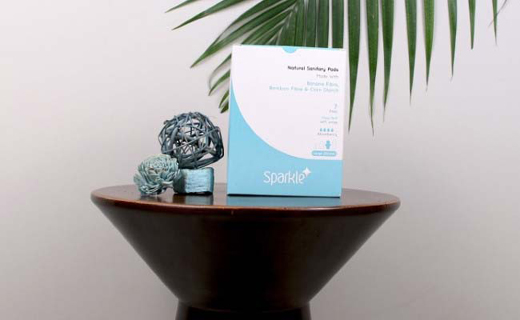Couple creates eco-friendly pads with banana fibre
Couple creates eco-friendly pads with banana fibre
Manglore Today News Network / Yahoo
February 17, 2020: Surat-based couple Chirag and Hetal Virani are on a mission – to break one of the biggest taboos in India by spreading awareness on menstruation, and improve menstrual-care through eco-friendly pads. Their startup, named Sparkle, has built biodegradable sanitary pads from banana fibre. Additionally, their ‘Buy One Give One’ initiative ensures that every time a Sparkle pad – which cost about Rs.20 – is sold, one is also sold to a woman who needs it but cannot afford it.



To their credit, Sparkle was selected as one of top five most innovative startups in health category by one of the biggest start-up competitions in the world, Tech Crunch Disrupt, in the US last year.
Chirag, despite the social stigma associated with a non-glamorous business like theirs, is clear about his path too. “In 2010-11, after my engineering and before doing my MBA, I went to Kenya, Tanzania, Vietnam, and quite a few other underprivileged areas where I volunteered at orphanages. I participated in medical awareness campaigns and that was the first time I was exposed to how menstruation can really affect girls’ life. I saw that since they don’t have access to sanitary pads, many girls could not even go to schools. I got the inspiration to do something then,” he says.
Hetal and Chirag co-founded an NGO, United World Foundation, in 2017, for working on women’s healthcare and educational prospects, and improving the farmer economy in rural areas. Initially, this NGO would buy pads available in the market and donate it to underprivileged women. But it was not sustainable as plastic waste is not bio-degradable.
As environment-friendly as it gets
Chirag comes from a family of farmers who own banana plantations. Once banana is harvested (in every 9-12 months), there is no need for the stems – which are about eight feet long and 60-100 kg heavy. Since the farm has to be cleared up for the next crop, hundreds of tonnes of stems were either burnt, causing air pollution, or had to be removed from the farms at higher labour expense.
On researching how to use this agro-waste as a sustainable raw material, he found that banana fibres have been used for making sanitary pads in Africa. Chirag and Hetal decided to do something along this line, as Hetal herself was finding commercially available sanitary pads dissatisfactory, a problem faced my many users in India.
Their family was shocked when Chirag presented the idea to them – why would he do this when he has an engineering degree and MBA? But the duo was determined.
Hetal, a chartered accountant, had earlier worked with Chirag in e-tail of diamond jewellery too. Pooling in $100,000 from their savings, they started product research and development (R&D) in 2018.
Long process
The first step to building Sparkle pads was to extract fibre from the banana stem. So the duo started with a machine that was readily available in the market. However, as a mechanical engineer, Chirag found many inefficiencies in the machine: it was too labour intensive, not cost effective, and had many safety issues.
After months of researching and spending 2-3 months at the farm, he developed a new machine to make the whole fibre extraction process efficient. Although Chirag designed the pads after wide research, Hetal rejected the first two attempts, but liked the third one. So they distributed the third model among 500 women, asking for feedback. With their input, the fourth model version eventually went to market. Within a month, they had sold around 50,000 pads.
3 birds with one stone
The duo wanted to address multiple factors: recycling agro-waste, removing the taboo around periods, and reducing plastic pollution.
According to Chirag, India has 800,000 hectares of banana plantation and they generate 65 million tonnes of agro-waste. Once the R&D stage was over, the duo started collecting agro-waste from the farmers in banana plantations in the region near Narmada river.
“We buy the agro-waste at a nominal cost. Earlier it was an expense for the farmers; now it is an income. So far we have processed more than 500 tonnes of banana stems. We’re also filing patents for these machines,” says Chirag.
Conventional pads contain up to 90% plastic, with the top layer made of polypropylene, bottom layer with polyethylene, and in the centre there is sodium bicarbonate. They take about 600 to 800 years to degrade in the landfill after disposal. In Sparkle pads, the top layer made of bamboo fibre, naturally antibacterial and very soft, and the bottom layer is made from corn starch. The base is an absorbent material made from the agro-waste. Chirag claims that the entire composition of the pad degrades in six months.
“In India, just one in six women are using pads today; so 150,000 tonnes of pad-waste is generated per year. And if all of 350 million women (of menstrual age) start using the pads, that will result in around a million tonne of pad waste.”
Reaching out
Conventional, commercially available plastic-based pads are sold at Rs.7-13, and most biodegradable pads (both domestic and foreign ones) are priced between Rs.18 and Rs.35.
To make their product accessible to the masses, Sparkle will soon launch a new version which costs Rs.10 per piece, with different packaging and layers. It is 100 percent biodegradable too, says Chirag, adding that the R&D was conducted in collaboration with multiple hospitals and gynaecologists, and their outreach is conducted by collaborating with multiple NGOs.
“Many investors and social enterprises they’ve approached us in terms of how they want to be part of us. There are no short cuts for success; our journey has only begun,” Chirag signs off.
- Sullia: Man lured under pretext of car hire, assaulted and killed; Two arrested
- Puttur: Priest couple arrested for attempting to rob retired college principal’s home
- Vitla: Massive fire guts electronics shop, several nearby stores damaged
- Mangaluru: Unidentified man’s body found in Bengre Phalguni river
- Nitte University Chancellor, N. Vinaya Hegde Passes Away
- Kogilu Layout eviction: MLA Bharath Shetty demands SIT probe into illegal settlements
- Karkala: Woman dies allegedly due to medical negligence; case registered against three doctors
- Udupi: Private bus crashes into hillside at Hulikal Ghat; child killed, several injured
- Mangaluru to get Vande Bharat soon, says Minister Somanna
- Mangaluru police issue strict guidelines and security measures for New Year celebrations
- Udupi: MLA Yashpal Suvarna’s WhatsApp account hacked; public warned against money requests
- Jewellery, cash worth Rs 15 lakh stolen during Mangaluru–Mumbai bus journey; complaint filed
- Goods tempo loses control, crashes into roadside house in Padubidri
- NORAD’s Santa tracker turns 70: How does Santa visit every country in just 24 hours?
- Video: Dubai Crown Prince shares dramatic moment lightning strikes Burj Khalifa
- No leave, rings on screen: Karnataka Bride engaged to Canada-based groom online
- Train stationmaster Cat ’Nitama’ dies in Japan, more than 500 attend funeral
- When a man arranged item dance for villagers as son cracked NEET: Papa backbencher rahe honge
- 75 years of the Indian Rupee: From Sher Shah Suri to today; a 500-year global journey
- IndiGo flight cancelled, techie couple attends own reception online
- Man outsmarts scammer using ChatGPT, viral post shows fraudster begging for mercy
- Love lives: Woman marries lover’s body after family kills him over caste
- Watch: Grandmother, 75, impresses social media with stunning dance moves and a flip
- HR88B8888 becomes India’s costliest car registration number at Rs 1.17 crore
- Mumbai Shocker: Kaali Mata idol dressed like Mother Mary; priest claims goddess instructed him
- Kerala restaurant’s "Completely Non-Vegetarian" signboard goes viral; internet reacts
- Zohran Mamdani takes oath as New York’s first Muslim mayor
- New Year’s eve celebrations light up Bengaluru amid tight security and crowd control
- Zomato, Swiggy hike gig workers payout amid strike call on New Year’s eve
- 25-year-old raped by 2 men, thrown out of moving van on deserted road in Haryana
- Contaminated water kills 7 in Indore, 2 civic body officials suspended
- 148 flights cancelled in Delhi as fog disrupts New Year travel plans, over 150 others delayed
- Uttarakhand: Two loco trains collide in Vishnugad-Pipalkoti hydroelectric project tunnel, 60 injured
- Shot by his colleague: Another Hindu man killed in Bangladesh; 3rd incident in two weeks
- India surpasses Japan to become world’s 4th largest economy
- Congress government has made state as Udta Karnataka like Udta Punjab, alleges B Y Vijayendra
- 4 dead, 9 injured after Mumbai’s reversing BEST bus crashes into pedestrians
- Air India Express pilot accused of hitting passenger arrested by Delhi police
- CITY INFORMATION
- TRAVEL
- TOURIST INFORMATION
- HEALTH CARE
- MISCELLANEOUS


 Write Comment
Write Comment E-Mail
E-Mail Facebook
Facebook Twitter
Twitter  Print
Print 